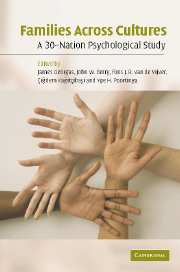Prologue
Published online by Cambridge University Press: 10 December 2009
Summary
This book is about similarities and differences in families across cultures. Family has been studied during the past two centuries by many disciplines, including sociology, cultural anthropology, psychology, education, psychiatry, economics, and historical demography, among other disciplines.
The perspective in this book is the relationships between psychological variables, the ecocultural context of countries, and family variables.
The book centers around three issues. The first examines how families differ in cultures across the world. What are the differences in family networks, family roles, and psychological variables among countries with different ecological and sociopolitical systems?
The second issue examines how families are alike across cultures. That is, to what degree are features of family similar in countries throughout the word?
The third issue involves family changes in societies throughout the world as a result of social changes, such as economic level, education, political systems, the global influence of television, and of communication through telephones, email, and the internet. Changes in family types in the last two centuries, as a result of industrialization and urbanization, have been described as transitions from the extended types of family systems to the nuclear family and more recently to the one-parent family. Understanding the nature of these developments is of scientific interest, but these changes are also important social issues in almost all countries throughout the world; research on the family has influenced government policies in many countries. Some family researchers as well as the media and governments talk about the crisis of the institution of family.
- Type
- Chapter
- Information
- Families Across CulturesA 30-Nation Psychological Study, pp. xxi - xxviPublisher: Cambridge University PressPrint publication year: 2006
- 1
- Cited by

